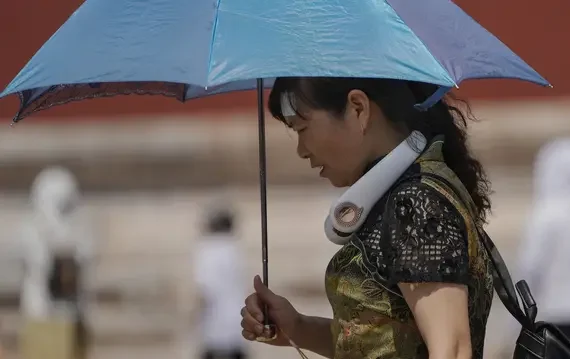Viral KlinikFarma -China is currently experiencing a severe heatwave that has led to unprecedented high temperatures, reaching up to 35°C (95°F) in various regions. This intense wave of heat has significant implications for public health, infrastructure, and daily life. In this article, we’ll explore the causes and impacts of the heatwave, provide tips for staying safe, and discuss the broader implications of such extreme weather events.
Table of Contents
ToggleUnderstanding the Heatwave
What Is a Heatwave?
A heatwave is a prolonged period of excessively hot weather, which may be accompanied by high humidity. The definition of a heatwave can vary by region, but it generally involves temperatures significantly above average for an extended period. Heatwaves can have serious effects on health, agriculture, and infrastructure, making them a critical concern for affected areas.
The Current Situation in China
China is facing one of its most severe heatwaves in recent history. Temperatures in many cities have soared to 35°C, with some areas experiencing even higher readings. This extreme heat has been exacerbated by high humidity levels, making the heat feel even more oppressive.
Causes of the Heatwave
Meteorological Factors
Several meteorological factors contribute to the occurrence and severity of heatwaves. These include:
- High-Pressure Systems: Persistent high-pressure systems can trap warm air close to the ground, preventing cooler air from moving in and leading to prolonged periods of heat.
- Urban Heat Islands: Urban areas, with their concentration of buildings and infrastructure, can absorb and retain heat more than rural areas. This phenomenon, known as the urban heat island effect, can exacerbate the impacts of heatwaves in cities.
- Climate Change: Long-term changes in climate patterns due to global warming can increase the frequency and intensity of heatwaves. Rising temperatures and shifting weather patterns contribute to more extreme weather events.
Seasonal Influences
The heatwave in China is occurring during the summer season, a time when temperatures naturally rise. However, the intensity and duration of the current heatwave are beyond typical summer variations, highlighting the role of climate change in amplifying seasonal weather patterns.
Impacts of the Heatwave
Health Effects
Heat-Related Illnesses
High temperatures pose serious health risks, including:
- Heat Exhaustion: Symptoms include heavy sweating, weakness, dizziness, nausea, and headache. If not addressed, heat exhaustion can progress to heatstroke.
- Heatstroke: A more severe condition where the body’s temperature regulation fails, leading to potentially life-threatening symptoms such as confusion, rapid pulse, and loss of consciousness.
Vulnerable Populations
Certain groups are more at risk during heatwaves, including:
- Elderly Individuals: Older adults are more susceptible to heat-related illnesses due to age-related changes in body temperature regulation.
- Children: Young children are more sensitive to heat and may experience dehydration more quickly.
- Individuals with Preexisting Health Conditions: Those with cardiovascular or respiratory conditions may experience exacerbated symptoms during extreme heat.
Impact on Infrastructure
Energy Demand
The heatwave has led to increased demand for electricity as people turn to air conditioning and cooling systems. This surge in energy use can strain power grids and lead to outages.
Transport Disruptions
High temperatures can cause problems for transportation infrastructure, including:
- Railway Lines: Extreme heat can cause railway tracks to expand and warp, leading to delays and safety concerns.
- Roads: Pavement can soften and become more prone to damage, leading to potential disruptions and safety hazards.
Economic Effects
The heatwave also has economic implications, including:
- Agricultural Losses: Prolonged heat can negatively impact crop yields and livestock, leading to financial losses for farmers and increased food prices.
- Healthcare Costs: Increased incidences of heat-related illnesses can drive up healthcare costs, both for individuals and healthcare systems.
Tips for Staying Safe During a Heatwave
Protecting Yourself and Others
Stay Hydrated
- Drink Water Regularly: Aim to drink at least 8 glasses of water a day, and more if you are active or sweating heavily.
- Avoid Alcohol and Caffeine: These can contribute to dehydration and should be consumed in moderation.
Keep Cool
- Stay Indoors During Peak Heat: Avoid going outside during the hottest parts of the day, usually between 10 a.m. and 4 p.m.
- Use Air Conditioning: If you have access to air conditioning, use it to help maintain a cooler indoor environment.
- Wear Light Clothing: Choose lightweight, loose-fitting clothing in light colors to help keep cool.
Check on Vulnerable Individuals
- Monitor Family and Friends: Check on elderly relatives, neighbors, and those with health conditions to ensure they are staying safe and hydrated.
- Seek Help if Needed: If you or someone else shows symptoms of heat-related illness, seek medical attention promptly.
Broader Implications of Extreme Heat
Climate Change and Future Risks
The current heatwave is a stark reminder of the broader issue of climate change. Extreme weather events are becoming more frequent and intense due to global warming. Addressing climate change through mitigation and adaptation strategies is crucial to reducing the frequency and severity of such events.
Policy and Preparedness
Governments and organizations need to enhance preparedness for extreme heat events by:
- Implementing Heat Action Plans: Developing and executing plans to protect public health during heatwaves.
- Investing in Infrastructure: Upgrading infrastructure to withstand extreme temperatures and reduce vulnerabilities.
The ongoing heatwave in China, with temperatures reaching 35°C, underscores the urgent need for effective strategies to cope with extreme weather conditions. By understanding the causes and impacts of heatwaves, taking necessary precautions, and addressing the broader issue of climate change, we can better prepare for and mitigate the effects of such extreme weather events. Staying informed and proactive is key to ensuring safety and resilience in the face of rising temperatures.







